Trudy J. Morgan-Cole's Blog, page 17
August 30, 2023
Hang the Moon, by Jeannette Walls
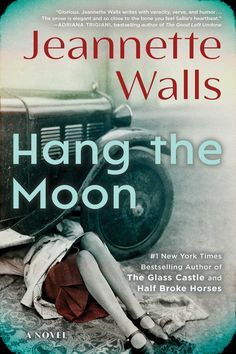
This is a historical novel with a neat historical call-back to an even earlier era. It’s set in the American south in the 1920s, when Prohibition is the law, bootlegging is big business, and the richest businessman in a tiny Virginia town is practically a king. Sallie is the daughter of “Duke” Kincaid, who only wants to impress and please her larger-than-life dad until an accident and a disapproving stepmother lead to Sallie being shunted off to live with an aunt. When she returns as a young woman to the family home, Sallie tries to find her place in her father’s world. Also vying for position are her younger brother Eddie, yet another new stepmother, Kat, an ambitious aunt and uncle, and a crowd of hangers-on.
If I hadn’t read a reference to it in an interview with the author, I don’t know how long it would have taken me to pick up the fact that the Kincaid family are essentially, and intentionally, the Tudors in a 20th century American setting. Maybe about the time the Seymours showed up, I’m not sure. Anyway, the power struggles and violence translate well into this setting, and Sallie is an appealing heroine, though perhaps not quite as intriguing as Elizabeth I.
King Solomon’s Carpet, by Barbara Vine
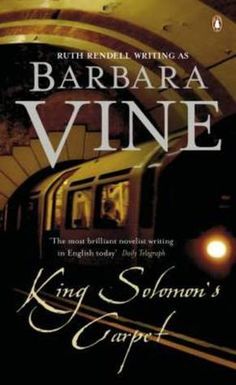
Barbara Vine and her alter ego Ruth Rendell is an author I haven’t read before, and I only picked this one up because my online book club was reading it and I was intrigued by the fact that the London Underground (which I love, as I love all subway systems, but London’s the most!) is central to the story. Subway trains rattle past the decaying old schoolhouse at the centre of this story; the school is now a rooming house filled with a disparate array of people, owned by a man who is obsessed with the Underground and with underground train systems in general, and is constantly researching the London system for a book he wants to write about it.
Against this backdrop a psychological thriller unfolds very slowly, building to a climax that should be exciting and satisfying but somehow isn’t. The characters are colourful when you see them in terms of thumbnail descriptions — two musicians who are lovers but not really in love, eking out a living as buskers in Tube stations; two small children, one of whom rides on the top of subway cars and dares his friends to do the same (don’t try this, kids!!!); the children’s cheerfully amoral mother, who is more interested in her many love affairs than in her children and who refuses to worry about or plan for the future; the mysterious stranger with an evil plan. But the passivity and lack of agency on the part of many of the key characters ended up frustrating me, and I found the ending in equal parts depressing and maddening, so while I loved the actual writing and the descriptions of the Tube, I can’t say the book itself was a total success for me. Still, I wouldn’t not recommend it — if you, too, love subway trains, if you love a not-too-thrilling thriller and you aren’t enraged by characters who simply drift along without taking control of their lives — you might enjoy this book.
August 27, 2023
Happy Place, by Emily Henry

Having enjoyed Emily Henry’s Book Lovers earlier this year, I had high hopes for Happy Place, a novel about a couple who pretend they haven’t broken up in order to keep the peace on their friend group’s annual summer vacation trip. However, this one was a bit of a disappointed. It’s evident that Harriet and Wyn still have feelings for each other, but we’re a long way into the book before there’s ever any conversation about why they broke up. Instead, there are pages and pages of … I know no other way to describe this … yearning. The book is from Harriet’s point of view and the main thing we know, a hundred pages into the book, is that she still finds Wyn really, really attractive and has a lot of feelings whenever he’s around.
Obviously there are other things going on, and it’s Emily Henry’s book; she’s a good writer. There are interesting dynamics within their friend group, and Harriet’s complicated feelings about the career she’s pursued relentlessly for a decade, and all that jazz. But mostly there’s just a lot of long, meaningful looks, and heavy sighs, and near-misses and near-kisses — all between two people whose relationship problems could be solved if they sat down and had one honest conversation. Which they eventually do, but it’s a long and not terrible fascinating journey to get there.
Romantic Comedy, by Curtis Sittenfeld
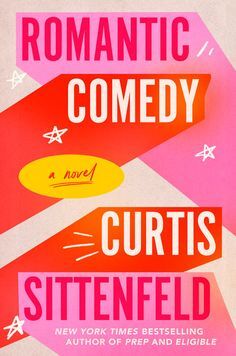
I absolutely loved this quick, breezy, and fun romantic novel about a TV sketch writer on a very, very-SNL-like show, who gets involved with a hugely famous singer-songwriter when he guest hosts the show.
Sally is a recently divorced thirty-something comedy writer who loves her job and takes care of her personal needs with a series of unromantic hookups with guys she meets on dating apps. She’s skeptical of the phenomenon she’s often observed of average-looking, even schlubby male writers and comedians dating and marrying incredibly hot, incredibly famous female actresses and pop stars, as she notices that it never seems to work the other way — a mega-star like Noah Brewster, for example, would never look twice at Sally Milz. Until he does.
This is really the heart of the novel; it’s pretty simple, and as always with a romance, I enjoy a twisted path to happy-ever-after that seems to put real obstacles (as opposed to flimsy made-up ones) in the couple’s way. As soon as Sally helps Noah rewrite a sketch and feels his intent gaze upon her, the reader knows they’ll end up together — but at times it seems genuinely impossible that they’ll do so. Sally’s low self-esteem – she sabotages their connection because she can’t believe a guy like Noah could really be attracted to her – is the biggest barrier, but Noah’s fame is a barrier in itself also. How can an ordinary person survive in the constant glare of cameras and gossip blogs analyzing any date a famous person goes on?
I’ve read some online reviews by people who didn’t like this book, and some of the main complaints I’ve seen focused on:
-too much time/detail being spent on the day-to-day to Sally’s job at the sketch show
-much of Sally’s and Noah’s relationship developing through an exchange of lengthy emails, thus making part of it an epistolary novel
-the latter part of the book being set in 2020 during Covid lockdowns, with a key plot point hinging on caring for someone who is dangerous ill with Covid.
Goodreads reviews are great for highlighting just how different we are as readers, since the above were three of the things I liked most about the book. I love epistolary stories, especially if translated into the modern day with emails and texts. I love stories where the characters’ work lives and other interests are not just window dressing, but where we get a deep dive into their world. And, of course, I love a well-executed Covid novel (I’m developing a list of them!).
If I have a quibble about this novel, it’s that Noah is maybe a little bit too perfect. Maybe he needed another flaw or two — but on the other hand, angsty or arrogant men are such a staple in romantic fiction that it’s nice to read about a guy who’s had a lot of therapy, has a good handle on his issues, and is able to talk about emotions and treat a woman like a human being. That’s sexy in my books (and in this book, too).
Dirty Birds, by Morgan Murray
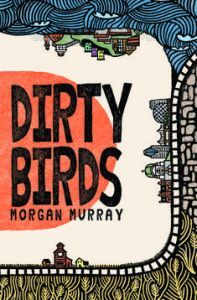
This book has been on my radar ever since it came out, since Morgan Murray is published by Breakwater Books (as am I) and his debut novel has scooped up some pretty serious credits in its short life. The book was longlisted for Canada Reads and shortlisted for the prestigious Leacock Medal (for Canadian humour). So although it took me awhile to work through my to-read list to get to this one, I was looking forward to it.
Dirty Birds is an engaging, sometimes even rollicking, journey through the coming-of-age of a young Everyman from Saskatchewan with the improbable name of Milton Ontario (of course he has to spend a lot of time explaining that’s his name, not where he’s from). Distinguishing himself at nothing in particular throughout high school and trades college, and disappointing a family who hopes he can get a good-paying job in the oil patch, Milton decides he wants to be a poet. He takes off on a cross-country bus to settle in the city of his dreams, home of his idol Leonard Cohen: Montreal.
Milton’s misadventures in Montreal — his unlikely assortment of roommates, the jobs he gets and fails to keep, the girl he falls hopelessly in love with but can’t impress, and his utter lack of success as a poet — all make for entertaining reading.
Dirty Birds has been compared to writers as lofty and literary as Kurt Vonnegut (and I guess being shortlisted for the Leacock award means it’s been compared to Stephen Leacock, on some level) but the first half of this book reminded me, more than anything, of one of my all-time favourite coming-of-age novels (which I’m relatively sure was not an inspiration for Murray, because it’s an 80s book that’s now quite obscure), Emma Who Saved My Life by Wilton Barnhardt. Just another aimless, gormless young wannabe artist, obsessed with a girl and unable to get his own life together, but describing it so well that it’s hilarious rather than annoying as it would be if you knew this guy in real life. Even Milton’s terrible Montreal shared apartment reminded me of Gil’s ever-descending scale of worse and worse New York accommodations.
BUT THEN.
Partway through, this novel takes quite the turn, from bildungsroman to thriller, or at least to a satire on thrillers, with Milton on the run from the unlikeliest crime boss of all time … and the hijinks just get wackier from there to the end.
I found this a fun and engaging read. I wasn’t entirely satisfied with the ending, but I do think it’s incredibly difficult to stick the landing on a story as sprawling, farcical, and twisted as this one, and it’s probably the best ending that could be found for this novel. A very enjoyable reading experience.
August 2, 2023
All of Us Together in the End, by Matthew Vollmer

This is such a lovely book that I read it in a day, but took weeks to process it before I was ready to write a blog post about it.
Like Stillwater by Darcie Friesen Hossack, which I reviewed for Spectrum magazine, All of Us Together in the End falls into the tiny, but always fascinating-to-me, category of books about Adventists that are not specifically written by or for Adventists. That alone would have been enough to hook me, as would Sari Fordham’s beautiful review of the book, also in Spectrum. (I should note that Fordham’s own memoir, Wait for God to Notice, is another book in this rarified category which I loved and wrote about here.)
However, what really made All of Us Together in the End a must-read-now book for me was the premise that drives this memoir. Matthew Vollmer, a former Adventist from a family with, to put it mildly, impeccable SDA credentials (OK, his aunt is married to Ted Wilson! Though I’m more impressed that his uncle was in the Wedgewood Trio, and also, I think, knew my uncle, because that’s Adventism for you), writes about the months following his mother’s death. Matthew’s father, who lovingly cared for his wife during her long decline with dementia, begins seeing mysterious lights in the trees near his home at night. Both Matthew and his father become fascinated with these lights, which have no logical explanation.
Of course, virtually everyone Matthew Vollmer tells about the lights has the same explanation, regardless of the person’s spiritual tradition or belief system: these lights, appearing so soon after the death of a beloved wife and mother, must be a message from her from the afterlife, letting her family know that in some way she is nearby and still with them. The only people not likely to accept this explanation would be a hardcore atheist who denies any supernatural phenomena — or a committed Seventh-day Adventist, who has spent their whole life believing that “the dead know not anything” and that any communication from “beyond” is a delusion at best, a demonic trap at worst.
This is such a very specific but, to me, very recognizable phenomenon, that I knew I had to read the book. One of my key family origin stories is of the night the Caribou was torpedoed and sank in 1942 and my great-grandfather, a crew member, was drowned. The story goes that the next morning my late aunt, his granddaughter (about 12 at the time), said she had seen Grandfather sitting by her bed during the night, even though she knew he was at sea. The family only learned of the ship’s sinking later. Anyone else in Newfoundland would call that a “token” — a visit from a family member’s spirit at the moment of their death far away — but everyone in our family were staunch Seventh-day Adventists; they had no explanation for this experience that would fit their worldview.
This is the cognitive dissonance that Matthew Vollmer writes about with such curiosity, openness, and humour. Of course, this book is about more than the mysterious lights. It’s about grief: about losing a parent and watching the other parent go through and then move on from that loss; it’s specifically about grief during Covid times, which reminded me of another great memoir I read this year, Nicole Chung’s A Living Remedy.
The book is also about the journey of losing your childhood faith while retaining the connection to loved ones who still hold that faith. For some people, this is a much more fraught and angst-ridden experience than Vollmer depicts it as in this book. He doesn’t get into a whole lot of analysis about his own “deconstruction,” and it seems, happily for him, that even the most deeply-Adventist members of his immediate and extended family are glad to maintain ties with those who are no longer in the church. This is another thing that fits well with my own experience (coming from a large Adventist family in which very few members are still actively involved in the church) but I realize that’s not everyone’s experience and for some people, it’s impossible to maintain those ties because there’s too much hurt and judgement.
If someone’s family has treated them harshly after they left their faith, and they write a memoir reflecting hurt and anger about that, that’s valid and I want to read it. But there was a kind of joy and relief in reading about a family that can still enjoy a meal of haystacks together when one member has left the church altogether and others are still active, not just in the pews but in leadership roles, since that’s what my own family is like.
That’s not to say that there’s no bittersweetness in this exploration of family, faith, and the loss of faith — even beyond the bittersweetness of loss and grief. Maybe it just comes from having an Adventist or perhaps a generally religious background, but as soon as I saw the title of the book I knew the context of the conversation in which it appears — in a flashback scene when Matthew Vollmer’s mother is still well and able to communicate, he asks her how she really feels about his having left the church, and she says, as many Christian mothers would, “I just want all of us to be together in the end.”
In the end, that is, after this life. In an afterlife that, to someone like Matthew’s mother (and perhaps to me?) has far less to do with mysterious flickering lights offering a comforting sense of presence, and more to do with the song Side by Side that we’ve all sung at a hundred summer camps and youth meetings:
Meet me in heaven, we’ll join hands together
Meet me at the Savior’s side
Meet me in heaven, we’ll sing songs together
Brothers and sisters, I’ll be there….
Pray that we all will be there.
This is a tender, thoughtful, beautifully written memoir, and could not have been more specifically targeted to my reading tastes if it had been personally addressed to me. But I think some of you might like it too.
Stillwater, by Darcie Friesen Hossack
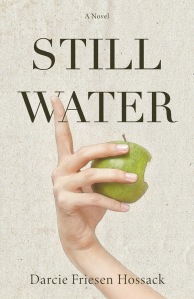
This is a book I would normally respond to with a lengthy personal reflection, since it’s a mainstream piece of literary fiction about Seventh-day Adventists, from a Canadian writer who is a former SDA herself. However, I was asked to write a review of it for Spectrum magazine, so I had to produce something thoughtful and well-researched, rather than just a “here are all the thoughts off the top of my head” spate of response I generally offer to readers of this blog. Please read my review here!
Year of the Tiger: An Activist’s Live, by Alice Wong
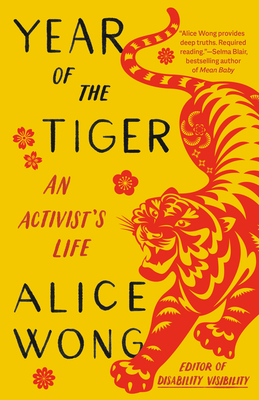
Writer and disability activist Alice Wong is someone I’ve followed on Twitter for awhile and whose writing has given me a much broader perspective on questions around disability and on what it’s like to live life with what I would label as “severe disability.” She raises really interesting and important questions about how society values (or usually, doesn’t value) disabled lives, and what constitutes “quality of life.”
Year of the Tiger is not a straightforward memoir, although it does contain a good bit of Wong’s life story; it’s a collection of pieces she has written for various outlets over the years — about disability justice, about the Covid-19 pandemic, about her intersectional life as a disabled Asian-American woman. It’s also illustrated with photographs, cartoons, etc. This makes it a great book for picking up, dipping into for a bit, and then putting down again, rather than the kind of straight-through, devour-in-a-few-days reading experience that it probably would have been if it were a memoir. Because of this, it took me awhile to get through, but I enjoyed it and, as always with Wong’s writing, I found it challenging and thought-provoking.
The Dawn of Everything, by David Graeber and David Wenbow
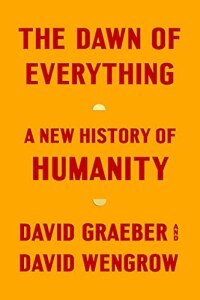
This is a classic example of the genre of “I listen to a long audiobook about a really in-depth subject I know very little about.” I don’t understand everything I hear and probably retain even less than I understand — audio format would not be ideal if I were trying to learn this material for a practical purpose — but the point for me is that it’s an easy way to expose myself to some new ideas and information while I go about my daily business of driving, washing dishes, walking the dog, or doing any other activity that I can do while listening to an audiobook.
This one is about the development of human culture in prehistoric times, and how a lot of the assumptions we have had about what pre-literate cultures were like are probably completely wrong. The authors touch on some of the myths, like the popular idea of a simple, egalitarian, almost Edenic hunter-gatherer period superseded by the dawn of “civilization” coming along with the development of agriculture and cities, leading to a loss of individual freedom as rulers and state structures took over. They argue that things in prehistoric times were actually a lot more complex than that, that centralized states were not an inevitable outcome of agriculture, and that rather than being subjected to a sort of inevitable “march of evolution,” ancient peoples actually made choices about the kinds of government they had, and those choices weren’t always what we’d expect.
The relevance of this for the present world, they argue, is that we find ourselves “stuck” in societies with tremendous inequality and find it nearly impossible to imagine different ways of conducting our affairs — so perhaps we have something to learn from more “primitive” peoples.
July 23, 2023
A Grandmother Begins the Story, by Michelle Porter
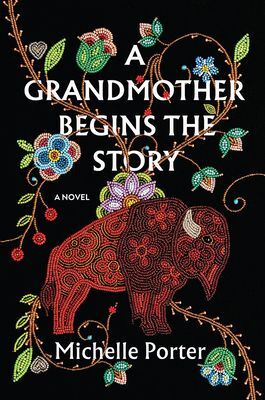
Michelle Porter has already written two brilliant, genre-bending books (Approaching Fire and Scratching River) that could be classified as memoir but incorporate elements of poetry and found text (of the two, Scratching River is closer to a traditionally-structured memoir). Both books draw on the history of the author’s Metis family, and the broader history of Metis people on the prairies, in both the past and present. So naturally, since novels are my favourite thing to read, I was excited to read Porter’s first novel, A Grandmother Begins the Story.
In this novel, we meet five generations of women in a Metis family in western Canada. This is not some heart-warming tale of a close-knit group of multi-generation women sharing living space and family stories. Rather, mothers and daughters are disconnected from each other — sometimes emotionally, but often literally, because of the legacy of family separation leading to broken relationships, addiction, abuse, all stemming from colonialism and the Canadian government’s efforts to dispossess, marginalize, and assimilate Metis people.
The scope of this story is very broad, as the narrative voice passes from one to another of the women in the family — some of whom are dead and telling their stories from beyond the grave. Nor are humans the only focus; the perspective sometimes shifts to members of a buffalo herd, the animal whose history and fate are so closely tied to that of Metis and Indigenous people on the prairies. Even the land itself gets a voice, reminding the reader of the interconnectedness of people, animals, and land. This is a story about a fractured and divided family that reminds us of the power of connection despite all the forces that work to tear people apart from one another and from the natural world.



